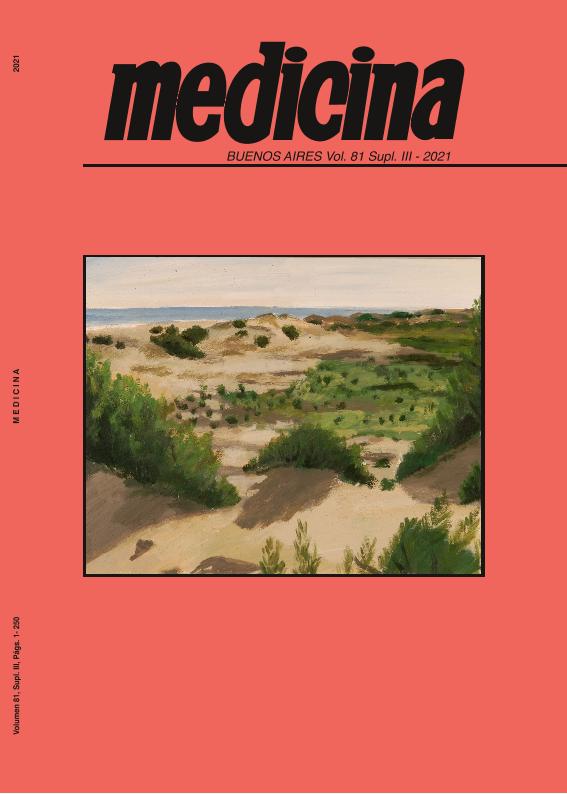Mostrar el registro sencillo del ítem
dc.contributor.author
Cuervo, Sanchez Marié
dc.contributor.author
Prado Spalm, Facundo Heber

dc.contributor.author
Furland, Natalia Edith

dc.contributor.author
Valles, Ana Sofia

dc.date.available
2023-01-16T17:24:44Z
dc.date.issued
2021
dc.identifier.citation
Maternal fructose consumption impacts on the developmental outcome of its progeny; Reunión anual de las Sociedades de Biociencia: LXVI Reunión anual de la Sociedad Argentina de Investigación Clínica; LXIX Reunión anual de la Sociedad Argentina de Immunología; LIII Reunión anual de la Asociación Argentina de Farmacología Experimental y XI Reunión anual de la Asociación Argentina de Nanomedicinas; Buenos Aires; Argentina; 2021; 171-171
dc.identifier.uri
http://hdl.handle.net/11336/184826
dc.description.abstract
Recent epidemiological evidence suggests that exposure to mater- nal obesity increases the risk of neurodevelopmental disorders in offspring. Given the rise in the prevalence of metabolic syndrome (MetS), a clinical condition closely related to obesity, it is important to understand the molecular mechanisms by which maternal MetS might impact offspring behavior and brain function. Ten, two-months-old female Wistar rats from our colony were sep- arated in two groups of five rats each, control (C) and fructose 20% (F). The former drank tap water while the later drank fructose 20 % (w/v) ad libitum during 10 weeks. Both F- and C dams were mated to chow-fed male rats on the 7th week of treatment and maintained on their respective diets throughout pregnancy and sacrificed on day 4 postpartum. At postnatal day (PN) 1, the progeny from both groups were separated from their mothers and continued lactating from control nurse dams. From PN3-PN21 neurodevelopmental re- flexes were evaluated. At PN22 all pups were weaned and behav- ioral tests (open field, marble test, elevated plus maze, novel object recognition, social reciprocal interaction test, tail flick test, rotarod, Kondziela’s inverted screen test) were performed on 4- to 12-week- old female and male rats. Results were considered statistically dif- ferent between the C and the F group when a p value of 5% or lower (p< 0.05) was obtained when applying the t-student test. Our findings strongly associate maternal fructose consumption with the induction of MetS and infertility. In addition, offspring from the F group presented alterations in the developmental milestones and social behavior; decreased grip strength and increased anxiety. Fur- thermore, long term memory also showed a tendency to be reduced. No modifications were noted in compulsive like behaviors, locomo- tion nor in nociception. All in all, maternal fructose consumption im- pacts on the developmental outcome of its progeny.
dc.format
application/pdf
dc.language.iso
eng
dc.publisher
Fundación Revista Medicina
dc.rights
info:eu-repo/semantics/openAccess
dc.rights.uri
https://creativecommons.org/licenses/by-nc-sa/2.5/ar/
dc.subject
dieta alta en fructosa
dc.subject
síndrome metabólico materno
dc.subject
neurodesarrollo
dc.subject
comportamiento
dc.subject.classification
Otros Tópicos Biológicos

dc.subject.classification
Ciencias Biológicas

dc.subject.classification
CIENCIAS NATURALES Y EXACTAS

dc.title
Maternal fructose consumption impacts on the developmental outcome of its progeny
dc.type
info:eu-repo/semantics/publishedVersion
dc.type
info:eu-repo/semantics/conferenceObject
dc.type
info:ar-repo/semantics/documento de conferencia
dc.date.updated
2022-11-09T15:28:53Z
dc.identifier.eissn
1669-9106
dc.journal.volume
81
dc.journal.number
suplemento III
dc.journal.pagination
171-171
dc.journal.pais
Argentina

dc.journal.ciudad
Buenos Aires
dc.description.fil
Fil: Cuervo, Sanchez Marié. Consejo Nacional de Investigaciones Científicas y Técnicas. Centro Científico Tecnológico Conicet - Bahía Blanca. Instituto de Investigaciones Bioquímicas de Bahía Blanca. Universidad Nacional del Sur. Instituto de Investigaciones Bioquímicas de Bahía Blanca; Argentina
dc.description.fil
Fil: Prado Spalm, Facundo Heber. Consejo Nacional de Investigaciones Científicas y Técnicas. Centro Científico Tecnológico Conicet - Bahía Blanca. Instituto de Investigaciones Bioquímicas de Bahía Blanca. Universidad Nacional del Sur. Instituto de Investigaciones Bioquímicas de Bahía Blanca; Argentina
dc.description.fil
Fil: Furland, Natalia Edith. Consejo Nacional de Investigaciones Científicas y Técnicas. Centro Científico Tecnológico Conicet - Bahía Blanca. Instituto de Investigaciones Bioquímicas de Bahía Blanca. Universidad Nacional del Sur. Instituto de Investigaciones Bioquímicas de Bahía Blanca; Argentina
dc.description.fil
Fil: Valles, Ana Sofia. Consejo Nacional de Investigaciones Científicas y Técnicas. Centro Científico Tecnológico Conicet - Bahía Blanca. Instituto de Investigaciones Bioquímicas de Bahía Blanca. Universidad Nacional del Sur. Instituto de Investigaciones Bioquímicas de Bahía Blanca; Argentina
dc.relation.alternativeid
info:eu-repo/semantics/altIdentifier/url/https://www.saic.org.ar/revista-medicina
dc.conicet.rol
Autor

dc.conicet.rol
Autor

dc.conicet.rol
Autor

dc.conicet.rol
Autor

dc.coverage
Internacional
dc.type.subtype
Reunión
dc.description.nombreEvento
Reunión anual de las Sociedades de Biociencia: LXVI Reunión anual de la Sociedad Argentina de Investigación Clínica; LXIX Reunión anual de la Sociedad Argentina de Immunología; LIII Reunión anual de la Asociación Argentina de Farmacología Experimental y XI Reunión anual de la Asociación Argentina de Nanomedicinas
dc.date.evento
2021-11-17
dc.description.ciudadEvento
Buenos Aires
dc.description.paisEvento
Argentina

dc.type.publicacion
Journal
dc.description.institucionOrganizadora
Sociedad Argentina de Investigación Clínica
dc.description.institucionOrganizadora
Sociedad Argentina de Inmunología
dc.description.institucionOrganizadora
Asociación Argentina de Farmacología Experimental
dc.description.institucionOrganizadora
Asociación Argentina de Nanomedicinas
dc.source.revista
Medicina (Buenos Aires)

dc.date.eventoHasta
2021-11-20
dc.type
Reunión
Archivos asociados
